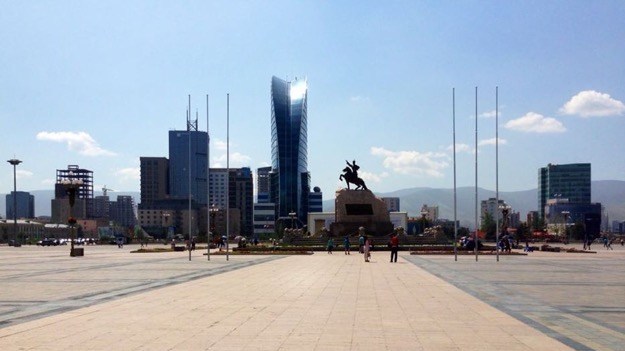
Overtone singing is the practice of splitting one’s voice so that two tones are audible. The tones can be the same note, or one can remain constant while the other modulates. Perhaps most eerily beautiful is when both tones change at the same time. The effect, you can imagine, is astonishing for those unfamiliar with the talent; an individual singer will produce two haunting voices simultaneously, both the lead and the background to the same song. The practice requires skill and a great deal of work to perfect.
The first time I heard overtone singing, I didn’t know what it was, so for me it was likely even more magical and shocking than the rest of the audience. I had no idea that was something that the human voice could do, and I’d sat down to watch a performance by the Tumen Ekh ensemble in Ulaanbaatar (Mongolia’s Capitol) with no knowledge that overtone singing and throat singing were practices thought to originate in Mongolia. Which is why attending a performance of cultural music was such an educational and lucky even to attend.
It was an unplanned event, something I heard about from another traveler staying at Idre hostel – located centrally, for those looking for good lodging while in the city. The free coffee and toast in the mornings is particularly great if you’re not a morning person and require some sort of food before your second eyelid will crack open of its own volition. Tickets to the ensemble were affordable, about $10 U.S. dollars. Even if music isn’t of particular interest and you know nothing about Mongolian musical tradition, the unique sound of the music, the masks, dance, and contortionists offer something for everyone.

This led me on a weird journey of fascination with musical performances in the area. I was travelling alone in Ulaanbaatar for nearly two weeks, after spending time in the desert. The city can be quite urban in parts, and while trips outside the city to hike or visit enormous monuments and natural landmarks are breathtaking, the activities within the city itself become limited once you’ve visited museums, monasteries, and dropped in at the black market a couple of times (Chinggis brewery was also worth a night or two out).
GOT NEWS? click here
Google News, Bing News, Yahoo News, 200+ publications
I also purchased tickets for the opera at the Mongolian State Academic Theatre of Opera and Ballet. The tickets were sold by seat and were affordable. The theater, while quite pretty, isn’t very large, so unlike larger venues, it doesn’t make an enormous difference if you buy a ticket at the front or back – better to save your money. It may have been offseason, but the theater was empty on the day that I attended, so it was completely acceptable to move forward 5 rows, making this a particularly good choice. The state opera is located in a pink columned building near the central square, within easy walking distance of other major buildings and museums in the city. There is no dress code, unlike some opera venues. It was absolutely acceptable to go in my casual travel clothes — a long-sleeved shirt and jeans.
The singers were talented, the acting was very “opera.” – which from someone as uncultured as I, means simply, very dramatic. At one point, a woman dying of consumption drank down a glass of champagne, before throwing the glass to the ground in a loud shatter, and then collapsing dramatically on a settee.
The only struggle for me personally was that I speak neither Mongolian nor Italian, and the singing was in the latter, while the screened subtitles were in the former – a was the concert pamphlet handed out at the door. If I’d not read the storyline prior to attendance, it would have been an exercise in frustration. But with slight preparation, it was easy to follow what was going on, and the splendor of the theater in combination with the costumes and storyline made for a very enjoyable experience.
So whether you’re looking for a classical music experience in the capitol, or have an interest in Mongolia’s traditional theater and music (my personal preference), there are a lot of options even during the offseason when many venues are closed.







